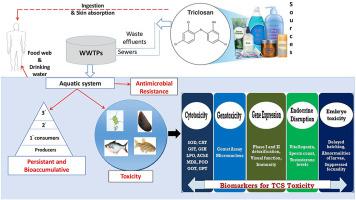Environmental Pollution ( IF 7.6 ) Pub Date : 2021-06-09 , DOI: 10.1016/j.envpol.2021.117569 Saurav Kumar 1 , Tapas Paul 1 , S P Shukla 1 , Kundan Kumar 1 , Sutanu Karmakar 2 , Kuntal Krishna Bera 2 , Chandra Bhushan Kumar 3

|
Triclosan (TCS), an emergent pollutant, is raising a global concern due to its toxic effects on organisms and aquatic ecosystems. The non-availability of proven treatment technologies for TCS remediation is the central issue stressing thorough research on understanding the underlying mechanisms of toxicity and assessing vital biomarkers in the aquatic organism for practical monitoring purposes. Given the unprecedented circumstances during COVID 19 pandemic, a several-fold higher discharge of TCS in the aquatic ecosystems cannot be considered a remote possibility. Therefore, identifying potential biomarkers for assessing chronic effects of TCS are prerequisites for addressing the issues related to its ecological impact and its monitoring in the future. It is the first holistic review on highlighting the biomarkers of TCS toxicity based on a comprehensive review of available literature about the biomarkers related to cytotoxicity, genotoxicity, hematological, alterations of gene expression, and metabolic profiling. This review establishes that biomarkers at the subcellular level such as oxidative stress, lipid peroxidation, neurotoxicity, and metabolic enzymes can be used to evaluate the cytotoxic effect of TCS in future investigations. Micronuclei frequency and % DNA damage proved to be reliable biomarkers for genotoxic effects of TCS in fishes and other aquatic organisms. Alteration of gene expression and metabolic profiling in different organs provides a better insight into mechanisms underlying the biocide's toxicity. In the concluding part of the review, the present status of knowledge about mechanisms of antimicrobial resistance of TCS and its relevance in understanding the toxicity is also discussed referring to the relevant reports on microorganisms.
中文翻译:

基于生物标志物的水生环境中三氯生毒性评估:机制综述
三氯生 (TCS) 是一种新兴污染物,因其对生物体和水生生态系统的毒性作用而引起全球关注。没有经过验证的 TCS 修复处理技术是核心问题,强调深入研究了解毒性的潜在机制并评估水生生物中的重要生物标志物以用于实际监测目的。鉴于 COVID 19 大流行期间前所未有的情况,不能认为水生生态系统中 TCS 排放量高出几倍的可能性很小。因此,确定用于评估 TCS 慢性影响的潜在生物标志物是解决与其生态影响和未来监测相关问题的先决条件。这是基于对与细胞毒性、基因毒性、血液学、基因表达改变和代谢谱相关的生物标志物的现有文献的全面审查,对突出 TCS 毒性生物标志物的第一次全面审查。本综述确立了亚细胞水平的生物标志物,如氧化应激、脂质过氧化、神经毒性和代谢酶,可用于评估 TCS 在未来研究中的细胞毒性作用。微核频率和 DNA 损伤百分比被证明是 TCS 对鱼类和其他水生生物的遗传毒性作用的可靠生物标志物。不同器官中基因表达和代谢谱的改变可以更好地了解杀菌剂毒性的潜在机制。在审查的结束部分,




















































 京公网安备 11010802027423号
京公网安备 11010802027423号